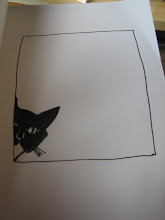
I finished this book yesterday. It was another serendipitous charity shop find, and I confess that I was initially attracted to it because of its Rob Ryan-illustrated cover (one of my favourite graphic artists). But on further inspection, it turned out that the book including its charming, quirky cover and graphics could have had "For the Postcolonial Rabbit" written all over it in Rob Ryan's lovely handwriting. An adult fairytale about childhood grief, featuring a dark, often terrifying fantasy world that draws heavily on Grimm's Fairytales, Angela Carter and Hans Christian Andersen, this was just my cup of tea.
Actually, in parts, it was too scary for me and I had several nightmares during the course of reading. (I am a wuss when it comes to horror and scary stuff in general and probably shouldn't have read it so late at night just before sleeping). Yesterday, in the final pages, Bartimaeus called me and I jumped out of my skin!
I did enjoy it though - and I suppose I'm starting to understand why some modes of terror can be pleasurable (I've never been able to understand that, until Pan's Labyrinth came along. I've always refused to watch scary films but I can't resist its dark, tragic beauty, and it is one of my favourite films). Anyway, The Book of Lost Things is in a similar vein, and I think it would make an incredible Guillermo del Toro film. There were some episodes in this novel that I think would make for fantastic cinema.
But it's the episodic, quest-orientated nature of the novel that I also found somewhat wanting. The story follows David, a boy grieving for his mother in WW2 England, into a dark alternate world, where he has to complete a quest to find the Book of Lost Things, and find his way home. On his way, David meets both friends and horrific, terrifying foes. I think the strongest part of the novel were the fairytales that David stumbles into, which were wonderfully realised. Whilst the overarching narrative structure was weak (I didn't feel that David's journey was particularly urgent, and the connection between the two worlds was laboured rather than executed with the panache exhibited by China Mieville in Un Lun Dun) the fairytales had a tightness of form that made me wonder if the novel had been produced from a series of short stories strung somewhat clumsily together. In addition, the prose, striving to be pared and simplistic, is often merely workmanlike, and this renders what could have been truly wondrous merely a fun ride. Connolly is no Carter. While there's darkness a-plenty, the magic is scant.
As a result, although the novel is about coming to terms with the death of a parent, I didn't feel as moved as I think I should have done (particularly given I've lived through this experience recently). In fact, I think Rowling renders grief and the process of living with it, with more emotional clarity. But for the grownup fairy stories, and the illustrations, overall, I would recommend this to fans of fantasy fiction. Connolly's is a dark, nightmarish world that is interesting to visit, even if one isn't compelled to remain.


JK Rowling does write grief really well; when Sirius died especially I felt like I'd personally lost someone I loved - in fact I cried through the last few chapters of the book (all my friends seem to have found Dumbledore's death more touching, so maybe it's just me...)
ReplyDeleteAnd I hear you about nightmares, my friends dragged me to watch The Final Destination 3D a couple of weeks ago and I've had at least 2 nightmares since about the idea of horrific accidents and people being doomed to die!
I have been meaning to read this for quite some time now, I keep seeing it in bookshops and it does look quite interesting. Thank you for the review, I'll definitely be sure to give it a read. Hope you're having a wonderful day.
ReplyDeletethis review sucked
ReplyDeletewell i read this book twice and u ARE a wuss cuz there isn't anything really scary bout it :) and imma girl :P
ReplyDelete